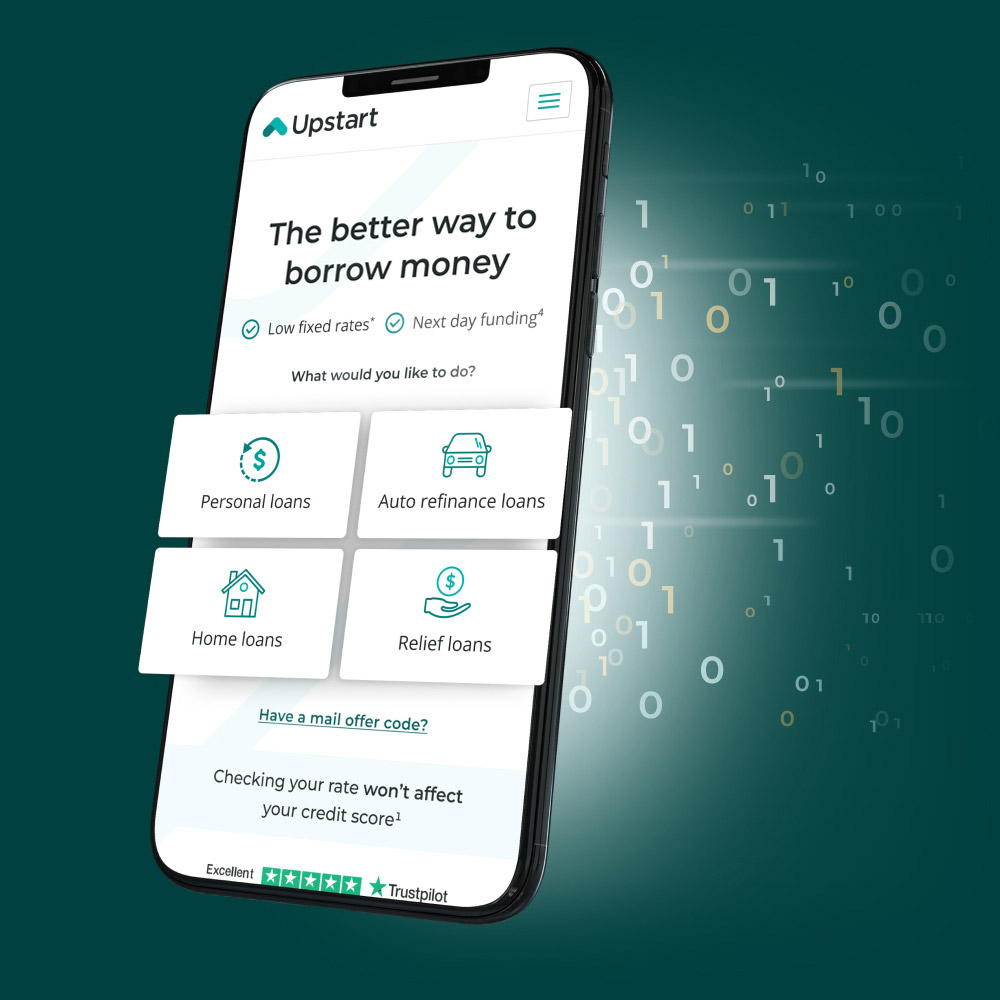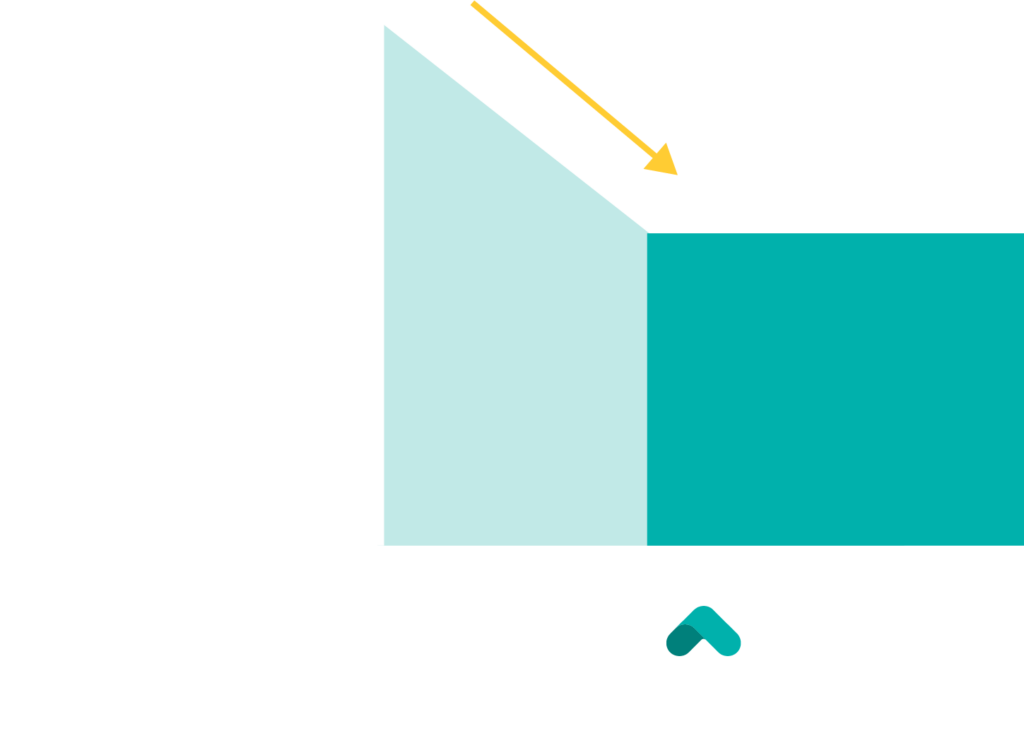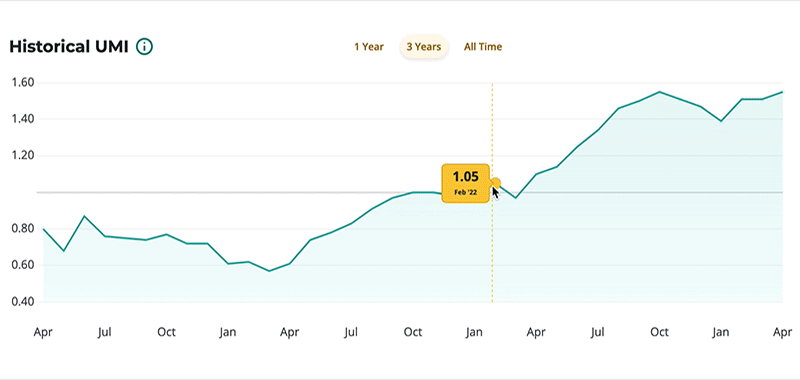Upstart is the leading AI lending marketplace
We connect millions of consumers to 100+ banks and credit unions who leverage Upstart’s artificial intelligence models and cloud applications to deliver superior credit products. Our platform includes personal loans, automotive retail and refinance loans, home equity lines of credit, and small dollar “relief” loans.







We're radically reducing the cost and complexity of borrowing
for all Americans
Why? Because credit really matters.
Money is a fundamental ingredient of life, and unless you’re one of the few percent of Americans with significant wealth, the price and difficulty of borrowing affects you every day. Throughout history, affordable credit has been central to unlocking mobility and opportunity.
Traditional lending is broken



For decades, traditional lenders used basic “scorecard” methods that combine credit scores and a handful of other variables to determine who is approved for a loan and at what interest rate. Unfortunately, these tools are limited in their ability to quantify risk.
How do we know? Four in five Americans have never defaulted on a loan, yet less than half have access to traditional prime credit. The implication is eye-opening. With a smarter credit model, lenders could approve almost twice as many borrowers, with fewer defaults.
*According to Upstart’s retrospective study completed in May 2025, which analyzed approximately one million Transunion credit reports dated 11/30/2024
The age of artificial intelligence
AI is shaping up to be the largest technology transformation of our time. Bigger than the web. Bigger than the cloud. Bigger than mobile.
Software that learns and improves in the same way we learn—through interaction with the real world—has unlocked possibilities we could only have dreamed of a few short years ago.
Upstart pioneered the application of artificial intelligence to lending, enabling a system that is dramatically more efficient and more accurate for both borrowers and lenders. Rapid developments in AI foreshadow a world where the right borrower is automatically approved at the right price, instantly and effortlessly.
How does Upstart AI remake the lending process?
It starts by vastly expanding the information used to inform a credit decision.
Our sophisticated personal loan underwriting model teases out the relationships among more than 2,500 variables2.
The model is trained on 104 million monthly repayment events.
With an average of 117,3381 new repayments due each business day across all our lending partners, our models optimize in response to daily loan-level repayment and delinquency data.

As a result, our proprietary and patented loan-month model can predict the likelihood of default or prepayment for each month of a loan term for every applicant.

We apply AI to verification and fraud detection for an instant and effortless experience.
Upstart applies AI to every step of the lending process. By automating identity verification, fraud detection, and income and employment verification, Upstart makes credit origination instant and effortless—for borrowers and lenders.
Modeling the impact of the Macro
With the Upstart Macro Index (UMI), we are tackling one of the most challenging aspects of lending—navigating changes in the economy. UMI helps our lending partners better understand and account for the effect that macroeconomic conditions have on credit performance.
More accurate, efficient, and inclusive lending
With Upstart AI, lenders can approve more applicants at lower rates while simultaneously delivering the exceptional digital-first experience customers demand.
Higher approvals 3
Lower APR 3
Fully automated 4
Higher approvals 3
Improved accuracy allows our bank partners to approve more applicants. Lenders retain complete control over their credit policy, business objectives, and risk appetite.
Lower APR 3
Improved accuracy also allows our bank partners to offer 33% lower APRs at the same approval rates. Lenders retain complete control over their credit policy, business objectives, and risk appetite.

Fully automated 4
Upstart enables banks to respond instantly to a customer’s loan request 24/7. More than 91%4 of loans are fully automated, with no human involvement by Upstart.
A commitment to regulatory compliance
Upstart ensures that every lender retains control over their credit policy, business objectives, and risk appetite. Each lender originates under their own charter, whether state or federal. And Upstart-powered loans from all partners are within the 36% maximum APR required under the Military Lending Act. Some of the important regulatory issues a responsible AI lending platform faces include:

Fair lending
An AI system, like any lending technology or process, must avoid unlawful disparate impact or statistical bias that would be harmful to disadvantaged groups. Fair systems also provide clear explanations to declined consumers so that they can improve their future creditworthiness.
Over the last seven years, Upstart has developed and refined a state-of-the-art fairness testing framework that evaluates every application, loan, and model for bias. This framework encompasses disparate treatment and impact evaluation, including qualitative and quantitative assessments. As part of our service, we provide both lender-specific and platform-wide fairness test results to each lender on our platform each quarter.

Data security and privacy
Consumers today expect fast service and zero downtime. Faster and more efficient credit origination is a win both for borrowers and lenders, but only if consumer data is managed responsibly and securely. At Upstart, we’ve built our privacy and security programs with consumers and lending partners in mind, with a mission to gain consumer trust by ensuring the safety, privacy, and security of all sensitive and personal data is our first priority.
As new technology emerges and the regulatory landscape evolves, we continuously strive to maintain the trust of our consumers and work closely with our lending partners to ensure we follow applicable regulations related to data privacy, data security, and fair credit reporting.

Safety and soundness
Models used in lending must perform reliably and react quickly to changes in risk. Through effective model development and risk management, lenders can leverage AI confidently to achieve their business objectives—even in difficult macroeconomic cycles. Upstart’s model risk management and model governance teams oversee model production, changes, and performance.
Our bank and credit union partners have successfully managed safety and soundness exams conducted by all major prudential regulators including the FDIC, OCC, the Federal Reserve, and NCUA. As a result, lenders can feel confident that our technology is properly vetted.

An active participant in the industry
Upstart regularly engages with advocacy groups, policymakers, and regulators to advance the responsible use of AI in lending and improve access to credit. We’re also a founding member of “More Than Fair,” a community of organizations dedicated to improving access to affordable and inclusive credit for American consumers and small businesses.
Join our mission
Upstart for Lenders
Grow your loan portfolio, approve more borrowers, and provide a digital-first experience.
Upstart for Auto Dealers
Transform your dealership with an AI-powered financing solution built to win more buyers and drive higher profits.
- As of 12/31/2025.
- As of 12/31/2025. “Variables,” often also referred to as “features,” refers to raw variables and combined variables considered in our AI models. A “raw” variable is a non-combined, conceptually distinct unit of data, such as “applicant-reported savings.” A “combined” variable is data that has been transformed, combined, or otherwise engineered from a raw variable or set of raw variables, such as “applicant-reported savings” divided by “loan amount.”
- As of publication in April 2025, and based on a comparison between the Upstart model and a hypothetical traditional model using Upstart data from Jan-Dec 2024. For more information on the methodology behind this study, please see Upstart’s Annual Access to Credit results here.
- In Q4 2025. Percentage of Loans Fully Automated, which is defined as the total number of loans in a given period originated end-to-end (from initial rate request to final funding for personal loans and small dollar loans, and from initial rate request to signing of the loan agreement for auto loans) with no human involvement required by the Company divided by the Transaction Volume, Number of Loans in the same period.
